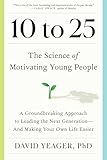10 to 25 : the science of motivating young people : a groundbreaking approach to leading the next generation-and making your own life easier / David S. Yeager, PhD.
Material type: TextPublication details: New York : Avid Reader Press, 2024.Description: 454 p. : ill. ; 24 cmISBN:
TextPublication details: New York : Avid Reader Press, 2024.Description: 454 p. : ill. ; 24 cmISBN: - 9781668023884 (hardcover)
- Ten to twenty-five
- 153.8 23
| Item type | Current library | Collection | Call number | Status | Date due | Barcode | Item holds | |
|---|---|---|---|---|---|---|---|---|
 100 - 199
100 - 199
|
West Grey Durham Branch Shelves | Non-fiction | 153.8 YEA (Browse shelf(Opens below)) | Checked out | 09/25/2024 | 33321003259174 |
Browsing West Grey Durham Branch shelves, Shelving location: Shelves Close shelf browser (Hides shelf browser)
Includes bibliographical references and index.
Imagine a world in which Gen Xers, millennials, and boomers interact with young people in ways that leave them feeling inspired, enthusiastic, and ready to contribute--rather than disengaged, outraged, or overwhelmed. That world may be closer than you think. In this book based on cutting edge research, psychologist David Yeager explains how to stop fearing young people's brains and hormones and start harnessing them. Neuroscientists have discovered that around age ten, puberty spurs the brain to crave socially rewarding experiences, such as pride, admiration, and respect, and to become highly averse to social pain, such as humiliation or shame. As a result, young people are subtly reading between the lines of everything we say, trying to interpret the hidden implications of our words to find out if we are disrespecting or honoring them. Surprisingly, this sensitivity to status and respect continues into the mid-twenties. 10 to 25 helps adults develop an ear for the difference between the right and wrong way to respect young people and avoid frustrating patterns of miscommunication and conflict. Yeager explains how to adopt what he terms the mentor mindset, which is a leadership style that's attuned to young people's need for status and respect. Anyone can adopt the mentor mindset by following a few highly effective and easy-to-learn practices such as validating young people's perspectives (rather than dismissing them), asking them questions (rather than telling them what to do), being transparent about your beliefs and goals (rather than assuming that they will accurately guess your thoughts), and holding them to high standards (rather than coddling them). Yeager's scientific experiments have shown these practices reduce a wide variety of behavior problems, including school dropout, unhealthy eating, stress, purposelessness, mental health problems, and more.
There are no comments on this title.







